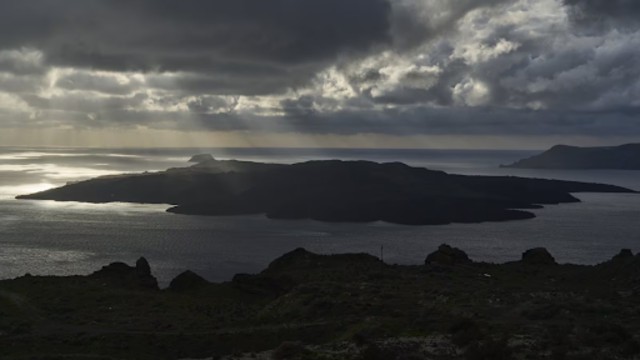
Sunlight shines on Nea Kameni, a volcanic islet that is part of Santorini, Greece, which has recently been affected by earthquakes, on Tuesday, February 4, 2025. AP Photo
Scientists have recorded thousands of small earthquakes near Santorini, Greece, over the past two weeks, sparking concern about the possibility of a larger tremor. The University of Athens' crisis management team reported that while most quakes have been minor, they cannot rule out a stronger earthquake.
The unusual seismic activity, which started in late January, has led authorities to declare a state of emergency on the popular tourist island. Rescue teams equipped with drones and a sniffer dog have been deployed, and the Coast Guard and Navy are on standby. Many residents and visitors have already left the island, and schools in Santorini and surrounding areas have been closed for safety reasons.
Hospitals are also preparing for any potential disaster. Extra doctors and paramedics have been stationed at Santorini’s hospital, and six emergency medical teams are ready to assist if needed. On Tuesday, hospital staff conducted an evacuation drill, wheeling patients out of the building to simulate a real emergency. Deputy Health Minister Marios Themistokleous emphasized the importance of preparing healthcare facilities for natural disasters like earthquakes.
Scientists are closely monitoring the situation, particularly the seismic activity between Santorini and Amorgos, as well as the two nearby volcanoes. They are unsure whether these frequent tremors, ranging from magnitudes of 3 to just above 5, will lead to a major earthquake or if they will continue at lower magnitudes over the coming weeks or months.
Since January 26, approximately 12,000 earthquakes with magnitudes above 1 have been recorded in the area. On Monday alone, 109 quakes were registered, including 13 with magnitudes above 4. The strongest, a magnitude 5.2 quake, struck on Monday night, followed by another magnitude 5 tremor two hours later.
"The possibility of a main earthquake following cannot be ruled out," the University of Athens stated in a report on Tuesday.
In response to the ongoing activity, scientists are deploying additional monitoring equipment to better understand the situation. Government officials, seismologists, and volcanologists are meeting regularly to assess the risks.
Greece is located in a highly active seismic zone, where earthquakes are common. However, experts say it is rare to experience such a continuous and intense series of tremors over an extended period.
Santorini is famous for its stunning landscapes, whitewashed houses, and blue-domed churches perched on the cliffs of a volcanic caldera. The island’s unique shape was formed after one of the largest volcanic eruptions in history, which caused the central part of the island to collapse into the sea.















